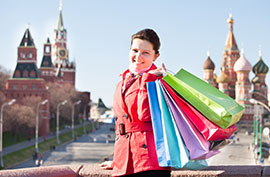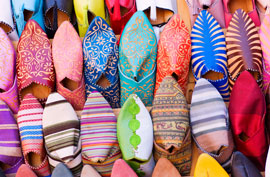 Some travelers get to know a place through its museums and monuments, others through its scenic landscapes or traditional cuisine. But for globetrotters who love to shop, there's no truer way to experience a place than by haggling with merchants in a bazaar, browsing the handcrafted wares of local artisans or sampling designer duds at the poshest boutique in town.
Some travelers get to know a place through its museums and monuments, others through its scenic landscapes or traditional cuisine. But for globetrotters who love to shop, there's no truer way to experience a place than by haggling with merchants in a bazaar, browsing the handcrafted wares of local artisans or sampling designer duds at the poshest boutique in town.
Shopping in a foreign country can be exciting and rewarding, but it's not without its pitfalls. The intricate art of haggling is often a challenge for visitors used to fixed prices at their mall at home, and the sea of cheap knock-offs and tacky souvenirs in just about any major tourist destination makes it difficult to tell when you've found a true local gem. Become a savvier shopper with our tips for avoiding fakes, haggling like a pro and getting your goods home at the end of your trip.
Finding Genuine Local GoodsHow do you know whether that cute handbag is a genuine designer item or if you're getting a good deal on that amazing carpet at the Turkish bazaar? Our rule of thumb is simple: research, research, research. Sure, window shopping and spontaneous spending are fun, but if you're looking to make a major purchase, you'll want to do your homework to make sure you're getting a good deal -- and the real deal.
If you know you're in the market for a certain item, such as blown glass in Venice or a traditional kimono in Japan, do some reading ahead of time to learn what to look for when shopping at your destination. Which qualities ensure that the item is genuine? Which scams should you keep an eye out for? A good guidebook can be invaluable here, offering purchasing tips as well as recommendations for reputable shops and markets.
Another good bet is to consult the concierge at your hotel; he or she will be able to point you to trustworthy vendors that specialize in the types of goods you're looking for. And, of course, the Internet offers a wealth of information on any type of shopping you can imagine. Hop online before your trip to gather the wisdom of other travelers.
Once at your destination, shop around before purchasing to familiarize yourself with the range of merchandise and prices available. (Hint: If the price seems too good to be true, it probably is.) Tour guides often take travelers to preselected shops for purchasing souvenirs, but use caution -- your guide may get a commission on anything you buy, often resulting in inflated prices. You may get a better deal at a shop you find on your own.
For big-ticket items such as jewelry and art, make sure to get a certificate of appraisal or authenticity at the time of purchase -- and, if possible, pay for your goods with a credit card. That will help protect you if you get home and discover that an item isn't actually worth what you paid for it.
 Top Holiday Shopping Destinations
Top Holiday Shopping Destinations
In North America and many parts of Europe, haggling is a bit of a dying art (unless you're on a used car lot!). But throughout the rest of the world, bargaining and bartering are a vital part of any transaction -- and you're unlikely to get a good deal unless you can master your own negotiating skills.
It's important to be familiar with the culture of the place you're visiting, as your haggling strategy will vary a bit from country to country. For example, in some parts of the world, it pays to be assertive and forceful when negotiating a price; in others, you'll do better keeping your tone soft and pleasant. Check your guidebook for a rundown on local haggling customs. CultureCrossing.net is another good source of information on cultural norms, listed by country.
No matter where you're traveling, bring a positive attitude into the transaction. Think of haggling as a game -- a competitive but ultimately fun and friendly exercise. Don't get angry or insult the seller, even if the negotiations aren't going your way. At the end of the day, both you and the merchant should feel happy with the outcome of the deal.
Never enter a haggling situation unprepared. By the time you approach the seller, you should have already shopped around and determined approximately how much the item you want to buy is worth. We suggest having two numbers in mind: the price you'd ideally like to pay and the maximum amount you're willing to spend.
 The Best Way to Carry Money Overseas
The Best Way to Carry Money Overseas
Here's a handy tip: If you're paying in cash, set aside the money that you're prepared to spend and keep it in your wallet; move the rest of your bills elsewhere. This serves two purposes. You can give the merchant visual evidence that this amount is the most you can possibly pay ("See? This is all I have!"), and it also helps prevent you from going over your own self-imposed price limit.
 On a related note, be sure to carry plenty of small bills so that you can pay the exact price of your item. Occasionally a merchant will claim that he can't make change for larger bills, hoping to convince you to let him keep the excess amount.
On a related note, be sure to carry plenty of small bills so that you can pay the exact price of your item. Occasionally a merchant will claim that he can't make change for larger bills, hoping to convince you to let him keep the excess amount.
Make the seller begin the negotiations by waiting for him to make the initial offer. If you're not sure how much to counteroffer, a good rule of thumb is to halve the initial price and negotiate from there. (As noted above, though, this strategy may vary from country to country.)
Traveling with a companion? Discuss who's going to do the talking and what you're willing to pay before you enter the shop and start haggling -- that way you can present a united front (and your husband won't ruin the deal right off the bat with an opening offer that's higher than the maximum you want to spend).
Don't show too much interest in the item you're negotiating for, no matter how desperately you want it. Looking too eager tells a savvy merchant that you're willing to pay a pretty penny to avoid walking out without that must-have item. In fact, you should be willing to walk; when you do so, you'll often find the merchant following you into the street with a new, lower counteroffer.
Don't rush the transaction. Negotiating a deal that works for both parties can take time -- so enjoy the process and go with the flow. (This is a tactical advantage too; if you appear to be in a hurry, the seller may think you'll settle for a higher price just to get out of there.)
That said, if the negotiations have gone on for a while and you've reached a stalemate over the last $5 or $10 difference in price, it may be time to let it go. What will you regret more -- leaving behind a unique memento of your trip or spending a few extra bucks? Remember, too: Odds are that if you're traveling in a developing country, the merchant probably needs that additional $5 or $10 more than you do.
Getting Your Purchases HomeDedicated shopaholics know to leave plenty of room in their suitcases for souvenirs -- or even pack an additional bag to fit the extras. Duffel bags are a good bet to serve as your extra bag because they fold easily and don't take up much space, but their flimsiness makes them appropriate only for dirty clothes and other unbreakable items, not your new porcelain vase. Valuable or delicate items should be wrapped carefully and stowed in your carry-on.
Occasionally you'll purchase something that's too large, heavy or fragile to carry home yourself. In these cases, you'll need to decide between having the store ship the item for you (which isn't always an option when buying from smaller merchants) and shipping it yourself.
If you're having the merchant take care of the shipping, be sure to buy insurance for the item, pay with a credit card, and get an itemized receipt specifying exactly what you purchased and how it will be shipped.
 If you'll be doing the shipping yourself, pack the item careful and label the box with the contents of the package, the monetary value of those contents, and either "Personal Use Purchase" or "Unsolicited Gift" (for Customs purposes). Your hotel concierge may be able to mail the package for you; alternatively, you can visit the local post office or seek out the nearest UPS, DHL or FedEx office (visit their websites for a list of locations). Again, purchase insurance for your package and pay with a credit card for the utmost protection.
If you'll be doing the shipping yourself, pack the item careful and label the box with the contents of the package, the monetary value of those contents, and either "Personal Use Purchase" or "Unsolicited Gift" (for Customs purposes). Your hotel concierge may be able to mail the package for you; alternatively, you can visit the local post office or seek out the nearest UPS, DHL or FedEx office (visit their websites for a list of locations). Again, purchase insurance for your package and pay with a credit card for the utmost protection.
Back in your own country, your goods will have to clear customs before you can bring them home. In general, U.S. residents are permitted to bring up to $800 worth of merchandise back from a trip without having to pay duty (numerous exceptions apply). For goods that you ship home, up to $200 is exempt from duty. Customs will inspect your packages when they arrive in the U.S., and if you owe duty you'll have to pay it when your package is delivered.
For more information on customs allowances for U.S. residents, see our Customs and Duty-Free Guide. If you reside outside the U.S., check out the following links or visit your own country's customs agency:
Canada Borders Services Agency
HM Revenue & Customs (United Kingdom)
Revenue: Irish Tax & Customs
Australian Customs and Border Protection Service
New Zealand Customs Service